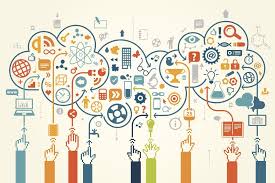A Smarter World. A Greater World: The World Top 20 Project
NJ MED says they can end global illiteracy by 2030
NJ MED believes they can save the world and make everybody in it smarter. By ending global illiteracy. Let’s see how they plan to accomplish this task.
We sat down with NJ MED’s CEO/ Founder, Mr. Albert Mitchell II, last January before the pandemic and asked him “Why do you think a small organization like yours can eliminate the impossible task of global illiteracy?
He said, “Illiteracy is a condition, not a disability. If we can provide the tools to improve the condition, then we can solve the problem.” Our only obstacle is our ability to think we cannot accomplish the impossible. Since we started NJ MED, we sought out the impossible and try to bend it to our will.”
We asked him, “What are the fundamental planks of your platform? He sat back in his chair, rocking, and said it with a cool and assured reply, ‘It’s not up to us. It’s up to the people that it effects. We cannot change what that does not want to change. We can only suggest what is there.”
Will, what does that mean?
“It means things around here do not look so good are you happy about that? Do you want to find a better way to live? It’s up to you.”
So it is a choice you tell them is the problem?
No, it’s a lack of wanting too. You want this, you want that, but if you do nothing, but want and want, and do nothing about it. That is what you get, nothing.
He said, “Winners go for it. They test their limits. They fight their fears and doubts and become what they want, what they need to have! So our message or platform is to wake up, team up and build power. Become a force, be energized. Make the impossible possible you can live with that.’
That sounds good in theory, but how do I a powerless person build up that much power to force change?
Mr. Mitchell said, “You need help. You need to find and work with people that have those resources to pull you forward. That is why we created the World Top 20 Project.
What is the World Top 20 Project?
He told me the project is broken down into three parts. All set-up to link with organizations and governments that are participating in the United Nation’s Sustainable Development Goals Initiative.
The purpose of this initiative is to ask countries to achieve 17 economic and social improvement goals by the year 2030. (Here is a link to those targeted goals and the indicators to measure their success).
Mr. Mitchell said their efforts and the World Top 20 Project focus is on Goal number four mission to “Ensure inclusive and equitable quality education and promote lifelong learning opportunities for all”.
He said, he spoke with UN Officials and asked them their biggest problem to achieving this target goal. They said there were over 260 million children out of school around the world and some 750 million adults already illiterate, and two-thirds of these are women. If nothing is done by 2030, many countries in Africa and Asia will face severe poverty and death. Because they are not able to create a workforce to sustain a family or economic development growth.
Mr. Mitchell said he asked where the data they were referencing this information from. The UN response was, each country keeps its data and shares it with the international body. However, most African and Asian country data is unavailable or has not been updated for some time.
Mr. Mitchell said he asked them if this was true, how do you know the size of the problem. He said the UN response was most of these figures are estimates. That’s when, he said, that is your biggest problem. You do not have accurate data. So there would be no way to measure how successful you are if you do not have a real established reference point.
That’s when, he proposed developing a project that can measure the real size of the problem, how to track progress annually, and measure the outcome of each target goal. Thus, NJ MED launched the World Top 20 Project to answer those questions.
The World Top Project’s 3 Stages are below:
- Create an Open Database to rank nations education systems
- Find Missing Education Data from each country
- Process and monitor the data annually until 2030
Global Education Movement – 5 National Education Goals
After listening to Mr. Mitchell talk about why they created a project to address the world illiteracy problem. We wanted more details on how it works. Here are the questions. We had, and here are his answers to those questions.

The first questions put to him were on general policy matters.
In your opinion, what is the method by which there is a disparity in a continent like Africa and Asia in education?
Political leadership: Most African nations rely on selling their goods. Not producing an economy to be self-sufficient. Because of poor trade agreements with the western continents, they are operating on the next deal mentality. Not building but keeping themselves in power is their focus.
Countries in Asia, however, the successful ones, practice and operate within a stable government. Their leadership and trade agreements are strong which ensures they can build an education system to continue their growth.
So how do you plan to close such a leadership gap for nations in Africa?
Ego: We want nations in Africa and around the world to prove themselves. We want them to feel they can accomplish anything if they work together. That is why we set goals for each nation to achieve by 2030.
What type of goals, and how did you set these goals?
He said, “Goals, which benefit everyone! From the largest cities to the smallest village, these are goals you can feel and touch. It is up to the leadership of the people to accomplish them. Plus, it’s a unifying approach to support each other, cheering for everyone to do their best.
The goals we set for each country. Where based on their current education data, their economic strengths, and their social environments. We then looked at their youth population size and projected how close they could come to accomplish the goals based on the three other variables.
Have any government agreed to your goals?
Not with us, but with United Nations SDG Initiative. If you look at the root of most of those Goals in the SDG, without a strong education system most of them will not be sustainable.
How has joined your project?
We have students, parents, teachers, educators, and other NGOs in 147 countries forming volunteer National Teams to bring awareness to their nation’s five education goals for 2030.
To do actually what?
Create National pride for their country. If you look at it, it does the same thing sports national teams do. They represent their country to try to bring happiness and accomplishment to its people. Our approach is the same but more meaningful. It helps everybody become better people.
Who is funding this project?
That is a local matter. We have support from the Google AD grant program and Pro Bono organizations working with us to organize the project. However, at the local levels, each national team will conduct its fundraising operations.
What type of organizational support is your NJ MED providing?
We have created a Facebook Group to help set-up National Teams. We provide weekly group assignments to build their message and set-up programs to help them get education data not available to the UN and other education institutions.
Getting Results
We then asked him how will you measure the success of his project. Will it be based on meeting SDG 4 target goals or countries reaching the five educational goals your project set.
How can we measure the success of your project?
Our project goals are the same as the UN. We want to improve the quality of education for students around the world. Our five goals address that.
We, however, feel it is vital that the stakeholders play a part. These stakeholders are student’s parents, teachers, and college students looking for answers to their future. Schools and universities will be responsible for providing education improvement, which will require school leaders and government support to invest more resources.
So our project success will be judged if we can bring all these stakeholders together to reach their educational goals by 2030.
You mentioned your project wants to improve five educational levels. How does that address the global illiteracy issue it seems the UN SDG 4 wants to focus on?
It helps to know your alphabet and how to count went you enter formal schooling. Therefore, it’s crucial to manage these skills to speed up your learning by the age of 5.
The points of making sure all children between the ages of 6 to 12 have access to a structured environment to process developmental skills. Sets a long term effect on their ability to become a productive adult.
As children reach the teen years of 14 to 18, social norms are developed that encourage them to use better decision-making skills as they enter adulthood. If they choose to advance those skills. Through higher education society benefits from a more well-rounded adult.
Therefore, our goals need for students to function literate at all five stages, and again none of this can be achieved if the stakeholders do not work together.
How can you make sure these stakeholders can or will work together?
Ah, it’s a project. We hope our approach works. Our theory is sound. The expected desire outcome for all participants is fulfillment and success.
So what makes you so sure it will work?
Again it is based on you. Do you want to be successful? Do you want your success to last forever? You can have this if this happens. Join us to make it happen.
Make what happen?
Build a self-conscious world of respect for yourself and your fellow man, a world where everyone is striving to be their best. Everyone living in a positive mindset.
How are you going to make this happen?
With three International Campaigns, one focus on patriotism – Everyone Behind the Flag, to accomplish the five educational goals for 2030. The second – Futbol and Books, to eliminate child illiteracy, working with the world’s largest sports community football (soccer). The third campaign – Adopt A Country, works with universities that are participating in the UN SDG to help process the Project’s database of nations.
It sounds like you put a lot of thought into this?
We have, and it is all ready to go.
How can someone find out more about your project and join if they want to help?
They can join their countries National Team by signing up at the project’s Facebook Group. Then starts posting their nation’s educational goals for 2030 on their social media accounts and participate with their National Team in seven international competitions representing their country.
Mr. Mitchell, we would like to thank you for your time and wish you great success with your project?
Thank you for helping us share our message with the world.
Interview conducted by Neely Fuller, a freelance writer for Medium, Vocal, and NJ MED



